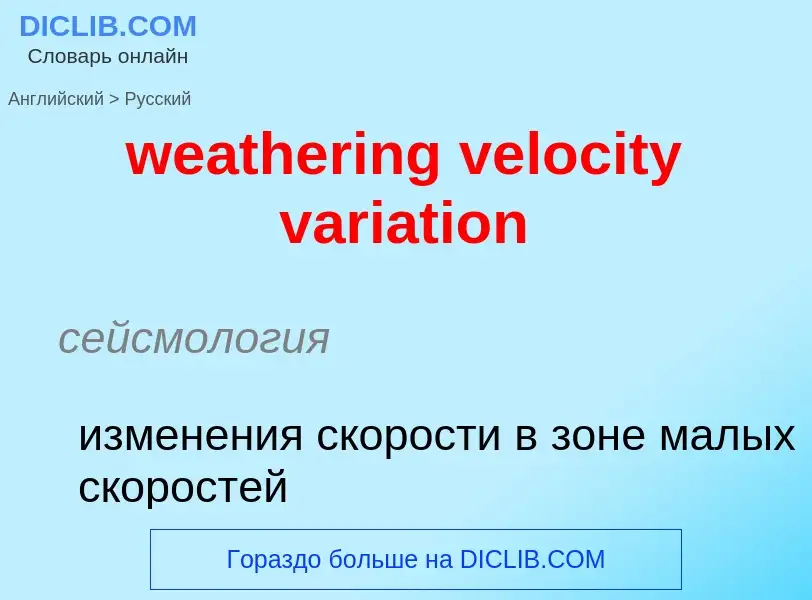Μετάφραση και ανάλυση λέξεων από την τεχνητή νοημοσύνη ChatGPT
Σε αυτήν τη σελίδα μπορείτε να λάβετε μια λεπτομερή ανάλυση μιας λέξης ή μιας φράσης, η οποία δημιουργήθηκε χρησιμοποιώντας το ChatGPT, την καλύτερη τεχνολογία τεχνητής νοημοσύνης μέχρι σήμερα:
- πώς χρησιμοποιείται η λέξη
- συχνότητα χρήσης
- χρησιμοποιείται πιο συχνά στον προφορικό ή γραπτό λόγο
- επιλογές μετάφρασης λέξεων
- παραδείγματα χρήσης (πολλές φράσεις με μετάφραση)
- ετυμολογία
weathering velocity variation - translation to ρωσικά
сейсмология
изменения скорости в зоне малых скоростей
[ve(ə)ri'eiʃ(ə)n]
общая лексика
вариация
изменчивость
изменение
вариационный
варьирование
колебание
колебательность
магнитное склонение
неравномерность
отклонение
разновидность
ход зависимости
нефтегазовая промышленность
отклонение (от номинальной величины)
Смотрите также
существительное
общая лексика
изменение
перемена
варьирование
колебание
разновидность
вариант
отклонение
изменение, перемена
склонение магнитной стрелки
специальный термин
вариация
физика
магнитное склонение
грамматика
флексия
биология
аберрация
генетическая изменчивость
мутация
Ορισμός
Βικιπαίδεια

Weathering is the deterioration of rocks, soils and minerals as well as wood and artificial materials through contact with water, atmospheric gases, and biological organisms. Weathering occurs in situ (on site, with little or no movement), and so is distinct from erosion, which involves the transport of rocks and minerals by agents such as water, ice, snow, wind, waves and gravity.
Weathering processes are divided into physical and chemical weathering. Physical weathering involves the breakdown of rocks and soils through the mechanical effects of heat, water, ice, or other agents. Chemical weathering involves the chemical reaction of water, atmospheric gases, and biologically produced chemicals with rocks and soils. Water is the principal agent behind both physical and chemical weathering, though atmospheric oxygen and carbon dioxide and the activities of biological organisms are also important. Chemical weathering by biological action is also known as biological weathering.
The materials left over after the rock breaks down combine with organic material to create soil. Many of Earth's landforms and landscapes are the result of weathering processes combined with erosion and re-deposition. Weathering is a crucial part of the rock cycle, and sedimentary rock, formed from the weathering products of older rock, covers 66% of the Earth's continents and much of its ocean floor.


![Concrete damaged by [[acid rain]] Concrete damaged by [[acid rain]]](https://commons.wikimedia.org/wiki/Special:FilePath/-47 Concrete weathering.jpg?width=200)


![[[Tafoni]] at [[Salt Point State Park]], Sonoma County, California [[Tafoni]] at [[Salt Point State Park]], Sonoma County, California](https://commons.wikimedia.org/wiki/Special:FilePath/Tafoni 03.jpg?width=200)
![[[Limestone]] [[core samples]] at different stages of chemical weathering, from very high at shallow depths (bottom) to very low at greater depths (top). Slightly weathered limestone shows brownish stains, while highly weathered limestone loses much of its carbonate mineral content, leaving behind clay. Limestone drill core taken from the carbonate West Congolian deposit in [[Kimpese]], [[Democratic Republic of Congo]]. [[Limestone]] [[core samples]] at different stages of chemical weathering, from very high at shallow depths (bottom) to very low at greater depths (top). Slightly weathered limestone shows brownish stains, while highly weathered limestone loses much of its carbonate mineral content, leaving behind clay. Limestone drill core taken from the carbonate West Congolian deposit in [[Kimpese]], [[Democratic Republic of Congo]].](https://commons.wikimedia.org/wiki/Special:FilePath/Weathered limestone cores.jpg?width=200)
![glacial drift]] near [[Angelica, New York]]. glacial drift]] near [[Angelica, New York]].](https://commons.wikimedia.org/wiki/Special:FilePath/Weathering 9039.jpg?width=200)

![Salt weathering of building stone on the island of [[Gozo]], [[Malta]] Salt weathering of building stone on the island of [[Gozo]], [[Malta]]](https://commons.wikimedia.org/wiki/Special:FilePath/Salt weathering in gozo.jpg?width=200)
![Qobustan]], [[Azerbaijan]] Qobustan]], [[Azerbaijan]]](https://commons.wikimedia.org/wiki/Special:FilePath/Qobustan-salt.jpg?width=200)
![alcove]] alcove]]](https://commons.wikimedia.org/wiki/Special:FilePath/Weathered sandstone, Sedona.jpg?width=200)
![Weathering on a sandstone pillar in [[Bayreuth]] Weathering on a sandstone pillar in [[Bayreuth]]](https://commons.wikimedia.org/wiki/Special:FilePath/Weathered sandstone DSC01497.jpg?width=200)
![Weathering effect of [[acid rain]] on statues Weathering effect of [[acid rain]] on statues](https://commons.wikimedia.org/wiki/Special:FilePath/Pollution - Damaged by acid rain.jpg?width=200)

![capital]] of [[Iran]] capital]] of [[Iran]]](https://commons.wikimedia.org/wiki/Special:FilePath/Physical weathering.jpg?width=200)
